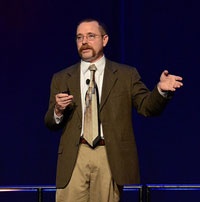“The total post-emergence weed control era is over and I don’t think it’s ever coming back.”
 That was probably the most memorable quote of the entire BASF Crop Protection “Science Behind the Future of Weed Control” event prior to the kick-off of the 2012 Commodity Classic in Nashville on Wednesday. It came from Row Crop Weed Specialist Dr. Larry Steckel with the University of Tennessee.
That was probably the most memorable quote of the entire BASF Crop Protection “Science Behind the Future of Weed Control” event prior to the kick-off of the 2012 Commodity Classic in Nashville on Wednesday. It came from Row Crop Weed Specialist Dr. Larry Steckel with the University of Tennessee.
“I often tell our growers, think back to 2002-2003, you’re going to think of that as the good old days, because weed control is never going to be that easy again, or simple or cheap,” he said.
Dr. Steckel estimates that resistant weeds in Tennessee cost growers $45 an acre more in herbicides last year. “We got 1.6 million acres so that’s $72 million in herbicide costs,” he said, not counting other costs like having to actually weed by hand, as many farmers in the south have had to start doing the past couple of years.
What this means is that growers just have to use all the tools in the toolbox now to fight resistant weeds, including pre- and post-plant herbicides, cultural practices, cover crops, row width, crop rotation.
Listen to or download Dr. Steckel interview: Interview with Larry Steckel
 Dr. Jeff Stachler, extension agronomist with North Dakota State University and the University of Minnesota, says the weed resistance problem is growing bigger. “The entire Midwest and even us in the northern plains are having a big issue,” he said. “The number one problem clearly is waterhemp, and not just glyphosate-resistant waterhemp, we have to deal with multiple resistant waterhemp.”
Dr. Jeff Stachler, extension agronomist with North Dakota State University and the University of Minnesota, says the weed resistance problem is growing bigger. “The entire Midwest and even us in the northern plains are having a big issue,” he said. “The number one problem clearly is waterhemp, and not just glyphosate-resistant waterhemp, we have to deal with multiple resistant waterhemp.”
And then there’s the ragweeds and marestail, which he thinks is being managed to some degree “compared to the waterhemp, which I think is getting out of control,” he said. “Weeds are here on the planet Earth for a reason, to cover the soil, and they have a huge genetic diversity that we don’t truly appreciate.”
Not to mention a tremendous survival instinct, which is why they are finding ways to adapt and outsmart the weapons designed to kill them. “It is hard to prevent resistance, but there are certainly things we can and need to do to reduce the risk and that simply is being more diverse in our practices,” he said.
Listen to or download Dr. Stachler interview: Interview with Jeff Stachler
2012 BASF Science Behind Photo Album
Coverage of the 2012 Commodity Classic Show is sponsored by BASF and New Holland